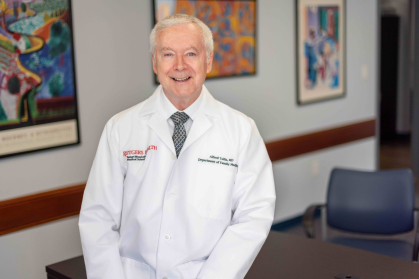Professors Push for Bridging the Biomedical-Behavioral Health Divide

With public health insurance targeted for cuts, Rutgers Health experts argue that integrated behavioral health is crucial for lowering costs and improving patient outcomes
At Family Medicine at Monument Square, a Rutgers Health primary care clinic in New Brunswick, N.J., doctors, nurses and even front-office staff are trained to connect behavioral-health services to every patient who needs them.
When patients present with mental health needs or behaviors affecting their overall health, integrated care ensures these issues are addressed holistically. While this approach isn’t common nationwide, two Rutgers Health experts believe it should be.
“If America truly wants to cut unnecessary spending, it must invest in not only primary care but also integrated behavioral health,” said Alfred Tallia, professor and chair of the Department of Family Medicine and Community Health at Rutgers Robert Wood Johnson Medical School.
He and Ann Nguyen, associate research professor and implementation scientist at the Rutgers Center for State Health Policy, said that integrating behavioral health within physical health models is among the most effective ways to improve outcomes, especially for underserved communities.
Implementation hurdles remain, but as lawmakers in Washington, D.C., focus on reducing overall health care spending, now could be the moment for an integrated behavioral health resurgence.
What is integrated behavioral health?
Ann Nguyen: Integrated behavioral health means bringing behavioral health services, like psychiatry, psychology and substance abuse counselling, into the primary care setting. The goal is to ensure all members of a patient’s care team – the medical doctors, nurses, front-desk staff and behavioral health providers – are working together to provide whole-person care.
Why is this a preferred approach to health care?

Alfred Tallia: The mind and body are connected, so it makes sense to have physical and mental health care services linked at the primary-care level. Consider hypertension. If you have hypertension, it’s typically exacerbated by social and psychological states. As a doctor of family medicine, if I only focus on treating hypertension without having solutions to other problems – depression, for instance – I’ll typically be unsuccessful in treating the chronic disease. Integrated behavioral health at the primary-care level is exceedingly important for getting good outcomes for patients and families.
Nguyen: The model helps address concerns like depression, anxiety and other common behavioral health problems, particularly addiction. With this approach, we can catch behavioral health conditions before they exacerbate into something that takes a ton more care and a ton more money to treat down the road. By embedding behavioral health providers into the same practice as the primary care team, care is more efficient – for providers and patients.
Ann recently published a blog post at the Milbank Quarterly, an influential medical journal, calling on policymakers to do more to fund behavioral health care. Why isn’t this model more common?
Tallia: We could blame Descartes, who said that the mind and body were separate universes. The health care system in this country really has grown up with this dichotomy between what I call biomedical health – bodily health – and behavioral health.
Family medicine has been at the forefront of changing this attitude, and graduate medical education training for family physicians at Rutgers, for instance, involves not just focusing on biomedicine, but also on behavioral health and social well-being.
The problem has been when you get out into the real world as a family physician, structures don’t always support this model.
What do you mean, structures?

Nguyen: Here’s a concrete example. One of the negative unintended consequences of requiring hospitals and clinics to use electronic health records, is that behavioral health and medical outcomes are in different tabs in the software, separating them even in the electronic environment. Primary care doctors must flip back and forth between these notes, and in some cases, might not even have access to notes from the psychologist or psychiatrist. In other words, even with modern record systems, we are unintentionally separating essential patient data.
Are there other reasons for the low uptake of integrated behavioral health?
Tallia: There are several. First, we have a shortage of behavioral health experts, particularly child psychiatrists, acute care interventionists and social workers. So, while the model works, there's a talent shortfall.
Additionally, there's been a bias in our health care system whereby insurance pays for procedures, things done to a patient, while cognitive and behavioral health services are not well rewarded or rewarded at all.
For instance, I can spend an hour with a patient addressing a behavioral health problem that is exacerbating their heart disease, and the reward for me in a fee-for-service world is maybe 1/300th of what a doctor performing a surgical procedure might be paid for 15 minutes of work. That’s not to denigrate the people who do procedures. We need those, too. But the current payment system in our health care approach is completely warped and doesn't support integrated models of care.
I assume calls to gut public health insurance programs, like Medicaid, will only exacerbate these challenges?
Tallia: I suspect it will exacerbate the siloing of health care and crush attempts to get away from a fee-for-service model to something that's more integrated, like blended payments. Will the free market come to the rescue and produce a model that supports integrated behavioral health in the long-term? I don’t know. But what I do expect for the short- and medium-term is that lines at emergency departments will grow, which will be bad for everybody but particularly those with mental health needs. An emergency department is the last place you want to be when you've got a problem that spans biomedicine and behavioral wellbeing.
What is Rutgers doing to bridge the biomedical and behavioral health divide?
Tallia: For over a decade we have provided integrated behavioral care at our clinical offices in Monument Square, training psychology postdocs alongside family medicine residents and physicians. Rutgers also established one of the first academic-based accountable care organizations to integrate behavioral health, yielding promising outcomes.
Nguyen: Rutgers University Behavioral Health Care is doing important work in this area, particularly its Center for Integrated Care, which has invested resources into training a new workforce to help fill this gap.


